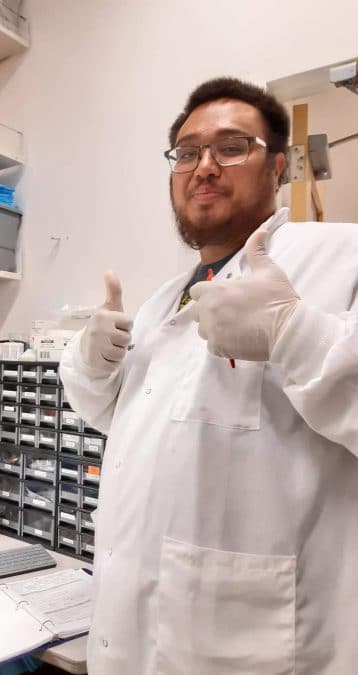In the fall of 2019, the University of California San Diego School of Medicine selected Bourassa descendant Leonard Almero as the first recipient of the Sycuan Medical Scholars Award. Offered by the college’s Office of Diversity and Community Partnerships as well as the Association of Native American Medical Students, the committee chose Almero for his research experience and his fervent aspirations to give back to the community.
He completed his Bachelor of Science in biochemistry and cell biology from UCSD this summer with the help of Citizen Potawatomi Nation Department of Education scholarships. Almero used the funds from the Sycuan award to study for the Medical College Admission Test and begin the graduate school application process. He plans to focus on cardiology or primary care.

Empowerment through research
“I was born with a heart condition, and so I’ve always been exposed to something dealing with the heart. So, I guess you could say cardiology is near and dear to my heart,” Almero said and laughed.
He completed research at UCSD labs as a student and as a summer intern at the University of Utah in 2018. Almero focused on antibiotic resistance and nutrition as related to hearth health. He studied how various compounds and medicines effect the cardiovascular system, including one from chocolate with protective properties. Ancient Mayans made a drink from the cocoa plant for medicinal purposes.
“These Indigenous people already knew … it was good for their body and everything,” Almero said. “For me, that’s something really cool. It’s some traditional type of medicine that they know that works but maybe not necessarily know how it works.”
His interest in cardiovascular disease and heart problems stems from their prevalence as leading causes of death among Native Americans. Almero hopes to study Indigenous communities exclusively in the future.
“It actually will, I think, in the long run have a positive impact within communities,” he said. “That will be the goal though is to do some type of research within (the Native population); that’s why I’ve been recently thinking about nutrition and the heart. … I think linking those two things is going to be vital and important to facing the greatest health disparities.”
Almero presented and spoke about his work and empowering Native students at the Doing Research in Indigenous Communities conference at Arizona State University in the summer of 2018.
Helping Natives achieve success in health care
Almero is 28 years old, and as the first recipient of the Sycuan Medical Scholars Award, he realizes the need for outreach to young Native students interested in the medical field. He currently works as part of a team developing a Native American research internship program at UCSD. Almero thinks of it as a “pipeline” to guide students from primary school to college.
“A lot of people say a lot of the problems are having to do with funding, which is true; there are funding issues. But some of the issues are amplified by certain things like a lack of Native representation within the health care field. … We’re trying to increase numbers because people like me, other Natives who want to go back and help their communities, we’ve got to give them a platform,” he said.
Almero is also developing a tutoring website for Native students at all levels. He previously tutored kids in mathematics and often gave them confidence in their abilities by presenting the curriculum in a different way. Now, he wants to provide those opportunities to tribal members across the country.
“The way it’s taught in schools, I don’t think is really intuitive, so I’m trying to find a way I can help with that,” Almero said.
The project remains in the developmental stages.
His additional research and outreach goals are a few of the many reasons why UCSD chose Almero for the Sycuan award and grant.
Indigenous voices in medicine
He sees disparities in his own family’s experiences with health care. Almero grew up in Anaheim, California. While his dad provided insurance for Almero and his siblings, his mother, who is a Tribal member, struggled to see doctors, often traveling out of state to reach an IHS clinic.
“For my mom, we had to go all the way to Arizona to get certain basic health needs. That’s not right,” Almero said.
“Why was I able to get such great access to health care, but my mom, she’s not able to get these basic services? … I think there’s certain things I can do to help alleviate that.”
He hopes to work for an Indian Health Services branch after finishing medical school. He always strives for inclusion and believes the medical community under represents Native Americans in a variety of ways.
“A lot of people think, ‘Oh, are you taking a seat away from me?’ And it’s like no. What we’re doing is we’re not taking a seat away from you at the table; what we’re doing is we’re building a bigger table, and we’re including more people, more voices so we can shed light on issues coming from the communities,” Almero said, whether that includes research, student outreach or available care.
He takes the MCAT this month and hopes to have his choice of medical schools after applying.
For opportunities with the CPN Department of Education, including scholarships, advising and internships, visit cpn.news/education.
